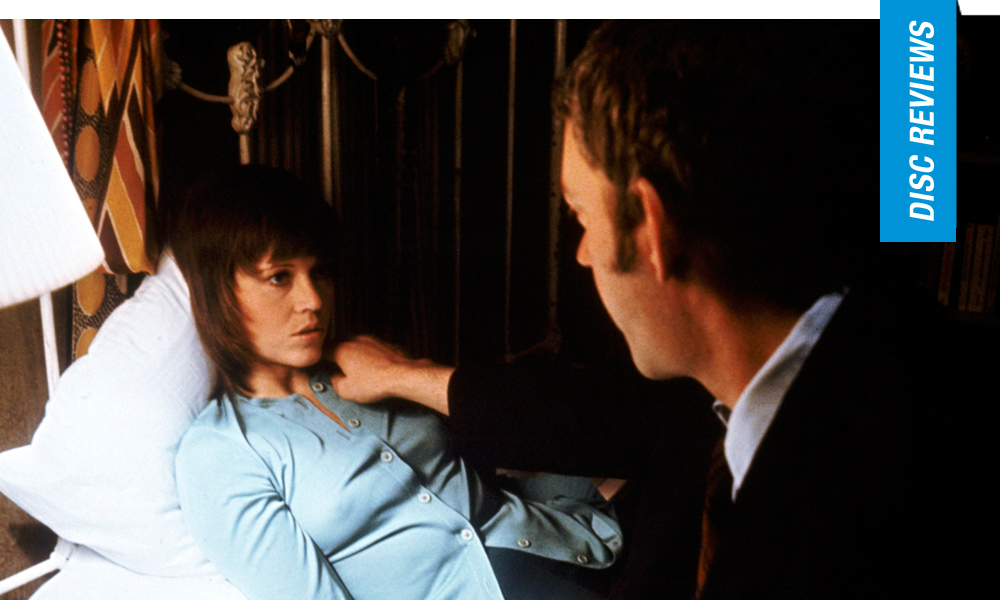Klute is, effectively, a bait and switch, beginning with its title, and cemented in its insistence on being a character study which obfuscates the genre vehicle it’s supposed to be safely enclosed within. Although the lengthy screenplay was trimmed to heighten the focus on Fonda’s Bree Daniels, both the performer’s magnetism and the simultaneously complex and empathetic development of her characterization allows for something rarely seen before or since—a contemporary woman with no qualms about extolling her desires or practicing agency. And yet, she’s also a tragic figure, even as her rampant paranoia ends up being justified by the development of the plot.
Fonda’s shared sequences with her therapist (Vivian Nathan) may be among her best moments of dialogue in Klute, but a myriad of gestures clue us in to the real Bree behind her resilient exterior (take, for instance, a small yet discernable reaction to a casting director at a flippant audition, for instance, when he immediately negates her methods as if she were a child). While Fonda and Sutherland don’t necessarily have the most remarkable chemistry (he fares much better with the rigid melancholy of Julie Christie in Don’t Look Now two years later), John Klute is robotically tenacious, and, if anything, a MacGuffin of narrative import comparable to that elusive Maltese falcon.
Surveillance as a tool of disassociation announces itself as the major motif of Klute (considered the first in Pakula’s loose ‘Paranoia Trilogy’ which would consist of The Parallax View and All the President’s Men). A disassociation of audio and visual is, of course, a parallel to how Bree removes her self during her sex with johns, a performer who can never truly enjoy the potential pleasure in these unions (which becomes confusing in her admission of enjoying the intimate sex she later shares with Klute). For what Klute lacks in narrative urgency it makes up for in ambience, partially thanks to an eerie score from Michael Small.
A number of noted supporting players pop up here, including Rosalind Cash, Roy Scheider, Jean Stapleton and Charles Cioffi. Blink and you’ll miss Sylvester Stallone, Candy Darling and Teri Garr in brief walk-ons. But above all, like other of Pakula’s greatest films featuring phenomenal female leads (The Sterile Cuckoo; Sophie’s Choice), this is really a Jane Fonda picture you’re watching, and it’s impossible to forget it (Fonda would later star in Pakula’s underrated 1978 Western Comes a Horseman and again in 1981’s Rollover).
Disc Review:
Criterion brings the first of Alan J. Pakula’s titles to their collection in 2.39:1 with uncompressed monaural soundtrack. Photographed by the esteemed Gordon Willis (responsible for many of Woody Allen’s early classics as well as Coppola’s The Godfather trilogy—notably, his last film was Pakula’s swan song, the ill-received The Devil’s Own, 1997), who brings his penchant for layering imagery cloaked in darkness to Klute’s textured interiors in shambles and seedy urban exteriors, while Fonda’s wardrobe was designed by a young Ann Roth.
Jane Fonda and Illeana Douglas:
Illeana Douglas interviews Jane Fonda in this thirty-six-minute segment recorded for Criterion, who discusses her experiences preparing for the role and experiences making the film.
The Look of Klute:
Journalist Amy Fine Collins explores the look and style of the production and costume design in Klute in this twenty-five-minute segment.
Television Interviews:
Two archival segments (Pakula on The Dick Cavett Show in 1978 and Fonda and Midge Mackenzie in 1973) are included.
Klute in New York:
This eight-minute archival bit looks at New York as explained by the thoughts of Pakula, Fonda and Sutherland.
Final Thoughts:
An iconic performance (and hairdo) from Jane Fonda makes Klute more addictive than ever, enhanced by the technological parameters and nostalgic reverence for the period in which it was made.
Film Rating: ★★★½/☆☆☆☆☆
Disc Rating: ★★★★/☆☆☆☆☆

